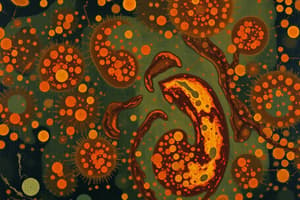Podcast
Questions and Answers
Which of the following is not a primary formulation method for the production of microbial insecticides?
Which of the following is not a primary formulation method for the production of microbial insecticides?
- Suspension concentrate formulation
- Emulsifiable concentrate formulation (correct)
- Liquid concentrate formulation
- Wettable powder formulation
What are microbial insecticides also known as?
What are microbial insecticides also known as?
- Biopesticides (correct)
- Chemical pesticides
- Herbicides
- Fungicides
What is the main purpose of wettable powder formulation?
What is the main purpose of wettable powder formulation?
- To create a powder that can be easily applied to the plant surface or soil (correct)
- To suspend the active ingredient in a liquid medium
- To produce a concentrate that can be easily applied to the plant surface or soil
- To mix the active ingredient with a solvent like ethanol or acetone
In suspension concentrate formulation, what is the resulting product?
In suspension concentrate formulation, what is the resulting product?
Which of the following can be used as a liquid medium in the formulation methods?
Which of the following can be used as a liquid medium in the formulation methods?
What role do formulation methods play in the production of microbial insecticides?
What role do formulation methods play in the production of microbial insecticides?
What is the primary advantage of emulsifiable concentrate formulations?
What is the primary advantage of emulsifiable concentrate formulations?
Why are microbial insecticides considered environmentally safe?
Why are microbial insecticides considered environmentally safe?
What role do microbial insecticides play in resistance management programs?
What role do microbial insecticides play in resistance management programs?
How do microbial insecticides contribute to sustainable agriculture?
How do microbial insecticides contribute to sustainable agriculture?
What is the main advantage of emulsifiable concentrate formulations over traditional chemical insecticides?
What is the main advantage of emulsifiable concentrate formulations over traditional chemical insecticides?
Why are microbial insecticides considered low in toxicity?
Why are microbial insecticides considered low in toxicity?
What makes microbial insecticides suitable for resistance management programs?
What makes microbial insecticides suitable for resistance management programs?
What is the potential impact of continued research and development in microbial insecticides?
What is the potential impact of continued research and development in microbial insecticides?
How do emulsifiable concentrate formulations contribute to sustainable agriculture?
How do emulsifiable concentrate formulations contribute to sustainable agriculture?
What is the main reason for the move away from the sole use of chemical control in insect management?
What is the main reason for the move away from the sole use of chemical control in insect management?
What is a primary concern about the environmental and human health impact of chemical insecticides?
What is a primary concern about the environmental and human health impact of chemical insecticides?
What has led to the increased cost of petroleum-based insecticides?
What has led to the increased cost of petroleum-based insecticides?
What has been a significant drawback of using chemical insecticides for insect management?
What has been a significant drawback of using chemical insecticides for insect management?
Flashcards are hidden until you start studying
Study Notes
Production of Microbial Insecticides
Microbial insecticides, also known as biopesticides, are products derived from microorganisms such as bacteria, fungi, and viruses that offer biological control of pests. These products are used in agriculture to control insects, fungi, and weeds. In this article, we will discuss the formulation methods for the production of microbial insecticides.
Formulation Methods
Formulation methods play a crucial role in the production of microbial insecticides. The formulation is the final product that is used in the field for pest control. There are three primary formulation methods:
-
Wettable powder formulation: This method involves suspending the active ingredient in the form of powder in a liquid medium. The liquid medium is usually water, but it can also be a solvent like ethanol or acetone. The resulting product is a wettable powder that can be easily applied to the plant surface or soil.
-
Suspension concentrate formulation: In this method, the active ingredient is suspended in a liquid medium. The liquid medium is usually water, but it can also be a solvent like ethanol or acetone. The resulting product is a suspension concentrate that can be easily applied to the plant surface or soil.
-
Emulsifiable concentrate formulation: This method involves dissolving the active ingredient in a solvent like ethanol or acetone and then emulsifying it in water. The resulting product is an emulsifiable concentrate that can be easily applied to the plant surface or soil.
Advantages of Microbial Insecticides
Microbial insecticides offer several advantages over traditional chemical insecticides:
-
Environmental safety: Microbial insecticides are generally safer for the environment as they are derived from natural sources and are biodegradable.
-
Low toxicity: Microbial insecticides have low toxicity to non-target organisms, including mammals and beneficial insects.
-
Resistance management: Microbial insecticides can be used in resistance management programs to control pests that have developed resistance to chemical insecticides.
-
Sustainable agriculture: Microbial insecticides contribute to sustainable agriculture by providing an environmentally friendly alternative to chemical insecticides.
In conclusion, the production of microbial insecticides involves various formulation methods, each with its advantages. These products offer a sustainable and environmentally friendly alternative to traditional chemical insecticides. As research and development in the field of microbial insecticides continue, we can expect to see even more innovative and effective products in the future.
Studying That Suits You
Use AI to generate personalized quizzes and flashcards to suit your learning preferences.




